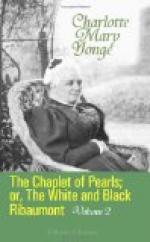This was Ambroise’s usual entrance, and it was merely guarded by a Scottish archer, who probably observed nothing. They then mounted the stone stair, the same where Osbert had dragged down his insensible master; and as, at the summit, the window appeared where Berenger had waited those weary hours, and heard the first notes of the bell of St.-Germain-l’Auxerrois, his breath came in such hurried sobs, that Pare would fain have given him time to recover himself, but he gasped, ‘Not here—not here;’ and Pare, seeing that he could still move on, turned, not to the corridor leading to the King’s old apartments, now too full of dreadful associations for poor Charles, but towards those of the young Queen. Avoiding the ante-room, where no doubt waited pages, users, and attendants, Pare presently knocked at a small door, so hidden in the wain-scoting of the passage that only a habitue could have found it without strict search. It was at once opened, and the withered, motherly face of an old woman, with keen black eyes under a formal tight white cap, looked out.
‘Eh! Maitre Pare,’ she said, ’you have brought the poor young gentleman? On my faith, he looks scarcely able to walk! Come in, sir, and rest a while in my chamber while Maitre Ambroise goes on to announce you to the King. He is more at ease to-day, the poor child, and will relish some fresh talk.
Berenger knew this to be Philippe, the old Huguenot nurse, whom Charles IX. loved most fondly, and in whom he found his greatest comfort. He was very glad to sink into the seat she placed for him, the only one is her small, bare room and recover breath there while Pare passed on to the King, and she talked as one delighted to have a hearer.
’Ah, yes, rest yourself—stay; I will give you a few spoonfuls of the cordial potage I have here for the King; it will comfort your heart. Ah! you have been cruelly mauled—but he would have saved you if he could.
’Yes, good mother, I know that; the King has been my very good lord.
’Ah! blessings on you if you say so from your heart, Monsieur; you know me for one of your poor Reformed. And I tell you—I who saw him born, who nursed him from his birth—that, suffer as you may, you can never suffer as he does. Maitre Ambroise may talk of his illness coming from blowing too much on his horn; I know better. But, ah! to be here at night would make a stone shed tears of blood. The Queen and I know it; but we say nothing, we only pray.
The sight of a Huguenot was so great a treat to the old woman in her isolated life, that her tongue ran thus freely while Berenger sat, scarce daring to speak or breathe in the strange boding atmosphere of the palace, where the nurse and surgeon moved as tolerated, privileged persons, in virtue of the necessity of the one to the King—of the other to all the world. After all brief interval Pare returned and beckoned to Berenger, who followed him across




